These days, it seems like you can’t walk into a store or turn on the TV without seeing an advertisement for an air purifier. They are not always the most cost-friendly items to purchase either, so we understand how anyone who is on a budget may hesitate before taking the plunge and investing.
🤔 But are air purifiers worth it?
We can answer this one right from the top – an air purifier is not a waste of money, and this article will explain why, using scientific data and clear explanations of the benefits.
However, we understand that budgets are tight now and might not be the right time for you to invest in a new product. It can help to arm yourself with an understanding of how air purifiers work and any benefits they can provide, should help you decide if they are worth it for you in the end.
With our expert knowledge, we will detail everything you need to know about air purifiers, including science-backed stats and how to choose your first one. This way, you can investigate air purifiers with all the facts before you decide whether buying one is good for your budget in the long run.
10 science-backed benefits of air purifiers
As we are surrounded by things that can pollute our indoor air quality, an air purifier can come in handy.
But don’t take our word for it; here are some scientific-backed benefits.
🤔 ‘Will an air purifier help my allergy symptoms?’
✅ Yes – Air purifiers with HEPA filtration can alleviate allergy symptoms. According to a study from the Journal of Allergy and Clinical Immunology, HEPA filtration helps lower particulate matter in the air that can cause allergic respiratory symptoms.
🤔 ‘I have a dust allergy, will an air purifier help?’
✅ Yes – Air purifiers can capture the dust mites that cause allergy and asthmatic symptoms, according to research by the Journal of Allergy and Clinical Immunology.
🤔 ‘I worry about mold as I love in a damp apartment, will an air purifier get rid of mold spores in the air?’
✅ Yes – HEPA filters can neutralize mold spores — According to Plos Pathogens, mold spores average in size between 4 and 20 microns. A HEPA filter is known to filter out particles down to 0.3 microns.
🤔 ‘I have pet allergies, will an air purifier help?’
🤔 ‘I have asthma, will an air purifier help?’
✅ Yes – Air purifiers are useful at reducing asthma symptoms in adults and children according to Yonsei Medical Journal.
🤔 ‘The cleaning products I use are giving me headaches, will an air purifier protect me against harmful chemicals in the air?’
🤔 ‘I live in an area affected by wildfires, is an air purifier a good investment?’
🤔 ‘I’m still worried about COVID-19, can air purifiers reduce virus particles in the air?’
🤔 ‘I’m a student and thinking about an air purifier for my dorm room, is it a good investment?’
✅ Yes – Air purifiers can have a positive impact on student success – According to a study from NYU, the use of air purifiers in classrooms correlates not just with healthier air, but improvement in student grades and work.
🤔 ‘I suffer from allergies that give me a stuffy nose, it’s making my life a misery — will an air purifier help me?’
✅ Yes – Air purifiers can reduce allergens that can cause a stuffy nose, according to a study in the International Archives of Allergy and Immunology.
How do air purifiers work?
All this talk about air purifiers in today’s world can leave one wondering: exactly how do they work? Air purifiers clean the air by using a combination of filters and a fan. The filters trap particles like dust, pollen, and smoke, while the fan circulates air in the room. This helps to improve air quality and reduce allergens.
Although there are air purifiers out there with numerous other filters, the general design is a three-stage setup:
1. Pre-filter

As the name implies, the pre-filter is the initial defense line for an air purifier. The fan draws in the air, then the pre-filter removes large pollutants like hair and dust. This filter ensures that the other filters are not overworked.
2. Activated carbon

The activated carbon filter removes Volatile Organic Compounds (VOCs) such as odors, and chemical fumes. The porous carbon filter absorbs VOCs, so the air is left feeling and smelling fresher.
3. HEPA

Last up is the HEPA filter — the strongest, and arguably most important part of an air purifier. This filter can remove around 99.7% of pollutants that are as small as 0.3 microns, like mold, pet dander, and even some virus and bacteria particles.
For a more detailed breakdown, check out our detailed report on how air purifiers work.
3 air purifiers to avoid
Although there are scientific benefits to using an air purifier, it is also true that not all air purifiers are helpful. In fact, there are some air purifiers you are better off avoiding in the long run.
⛔ Ozone generators — According to the Environmental Protection Agency, there is no real medical usage for ozone. Any germicide that uses it will use it in such high amounts that it is more harmful to your health.
⛔ Personal air purifiers — These are too small to handle anything beyond your immediate self.
⛔ Air purifiers with UV-C light — This can help in the elimination of viruses and bacteria, but UV-C can also be harmful to your health if exposed to it. If you do want an air purifier with one, make sure that the UV-C light is properly contained and that it doesn’t produce too much ozone.
4 things to consider when buying your first air purifier
1. Your unit needs to be sized according to the volume of the room it is meant to purify
Choosing an air purifier too weak for a room will leave the air stale and unfiltered, while choosing an air purifier too powerful for a room will lead to energy waste and take up unnecessary room, as you also need to consider where to put it.
Most portable air cleaners are rated by their Clean Air Delivery Rate (CADR), an industrial standard of measurement maintained by the Association of Home Appliance Manufacturers.
The CADR measures in cubic feet the amount of a certain particulate – dust, pollen, or smoke – that is removed from the air, and is essentially a measure of how well an air purifier can clean a room. The larger the room, the higher CADR that is recommended.
We can determine whether an air purifier is a good fit for a room by comparing its CADR to the size of the room it is meant to sanitize in two easy steps
2. HEPA filtration is essential
We’re willing to die on the hill for this one. The HEPA filter removes tiny common household airborne particles that can harm our health, including:
- Bacteria
- Viruses
- Mold
- Pollen
- Smoke
In order to be granted HEPA certification, the filter must be independently tested by the American Society of Heating, Refrigerating, and Air Conditioning Engineers (ASHRAE). During the tests, the filters are put through their paces and rated by their Minimum Efficiency Reporting Values, or MERVs, measuring their efficiency at capturing varying-sized particles, all the way down to ultrafine size.
While the HEPA certification guarantees that a filter can remove at least 99.7% of any airborne particles, there are three types of HEPA filters:
- Classic HEPA — 99% of particles removed
- True HEPA — 99.97% of particles removed
- Medical-Grade HEPA — 99.995% of particles removed
It’s worth doing a bit of reading to help you decide which kind of HEPA filter is right for you before taking the plunge. To help, check out our guide here.
3. Consider the ongoing costs
When buying an air purifier, it’s not only the price of the unit you need to consider. It would be best if you also thought about how much it will cost to run. Air purifiers use electricity, electricity costs money, and those costs are growing…rapidly.
Luckily, manufacturers are making air purifiers more energy efficient. As efficiency is at the forefront of our global warming, brands are starting to show they care by getting their products energy certified by companies like Energy Star.
We calculated this cost using the average price of energy in California. Check out our Air Purifier Usage Calculator to determine what 52.5 watts will cost in your state.
Not only do you need to power your air purifier, but you also need to keep it working at its maximum efficiency. This includes replacing its HEPA and activated carbon filters. Over time, these filters become clogged with all the contaminants they’ve pulled out of the air in your home. Once they become full, they become less efficient.
Replacing these filters is an expense you can’t skip on. After all, there’s no point paying to run an air purifier if the filters are too full to do their job.
4. DIY might be the way to go if you’re on a REALLY tight budget
If you really want to budget, you can always DIY your air purifier. Yes, when done correctly, this can work.
However, it will not work as well as professionally made air purifiers. Also, you have to tend to it at all times, so you cannot exactly turn this on and leave home like you can with a store-bought air purifier.
So, are air purifiers a waste of money?
The answer is no: air purifiers can do a quality job of reducing particulates and improving respiratory health. Hopefully, we’ve given you some food for thought before you make a purchase.
Take your time to find the right air purifier for you and your budget, and you won’t regret it.
Be aware of manufacturers’ claims of new technology and go for filters like activated carbon and HEPA that have been shown over many years to perform well in academic peer-reviewed studies. We have even put together a list of the budget air purifiers that currently recommend that don’t have significant initial or ongoing costs but still perform well at removing pollutants from the air.
SOURCES
- Bragoszewska, E., et al. (2021). Efficiency of Air Purifiers at Removing Air Pollutants in Educational Facilities: A Preliminary Study. Frontiersin.org
- Claudia, S., et al. (2008). Can the Use of HEPA Cleaners in Homes of Asthmatic Children and Adolescents Sensitized to Cat and Dog Allergens Decrease Bronchial Hyperresponsiveness and Allergen Contents in Solid Dust? karger.com
- Ebi, K. L., et al. (2006). Climate Change and Human Health Impacts in the United States: An Update on the Results of the U.S. National Assessment. ncbi.nlm.nih.gov
- Gilraine, M. (2020). Air Filters, Pollution and Student Achievement. edworkingpapers.com
- Health Canada. (2021). Wildfire smoke 101: Using an air purifier to filter wildfire smoke. canada.ca
- Lee, G. H., et al. (2020). Effects of Indoor Air Purifiers on Children with Asthma. ncbi.nlm.nih.gov
- Li, C. H., et al. (2011). Sporangiospore Size Dimorphism Is Linked to Virulence of Mucor circinelloides. journals.plos.org
- Luczynska, C. M., et al. (1990). Airborne concentrations and particle size distribution of allergen derived from domestic cats (Felis domesticus). Measurements using cascade impactor, liquid impinger, and a two-site monoclonal antibody assay for Fel d I. pubmed.gov
- Morris, A. C., et al. (2021). The Removal of Airborne Severe Acute Respiratory Syndrome Coronavirus 2 (SARS-CoV-2) and Other Microbial Bioaerosols by Air Filtration on Coronavirus Disease 2019 (COVID-19) Surge Units. academic.oup.com
- Olson, B. (2016). Testing of a Photo-electrochemical Oxidation (PECO) Air Purifier for Generation of Secondary Pollutants and Testing of an Activated Carbon Filter for Outgassing. s3.amazonaws.com
- Reisman, R. E. et al. (1990). A double-blind study of the effectiveness of a high-efficiency particulate air (HEPA) filter in the treatment of patients with perennial allergic rhinitis and asthma. sciencedrect.com
- United States Environmental Protection Agency. (2022). Indoor Air Quality. epa.gov
- United States Environmental Protection Agency. (2022). Ozone Generators that are Sold as Air Cleaners. epa.gov
- Wilson, J. M., et al. (2018). Home Environmental Interventions for House Dust Mite. pubmed.gov


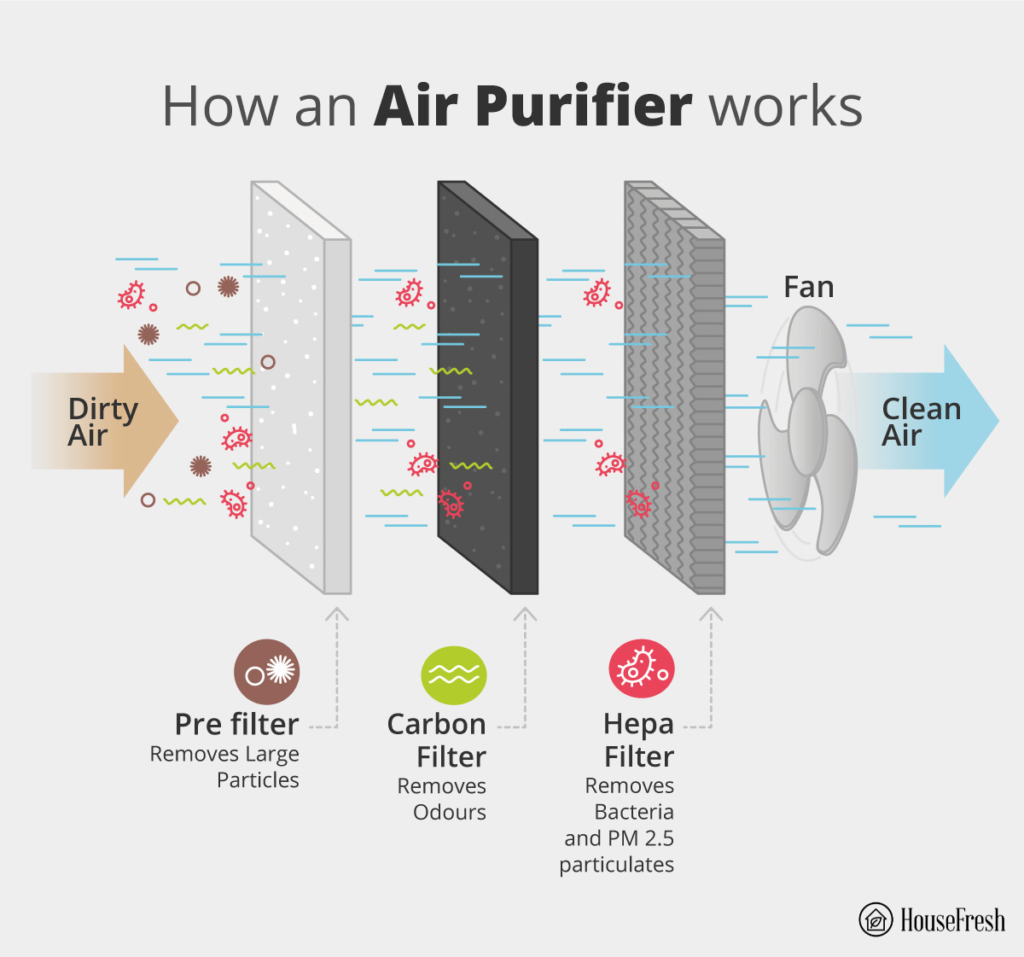
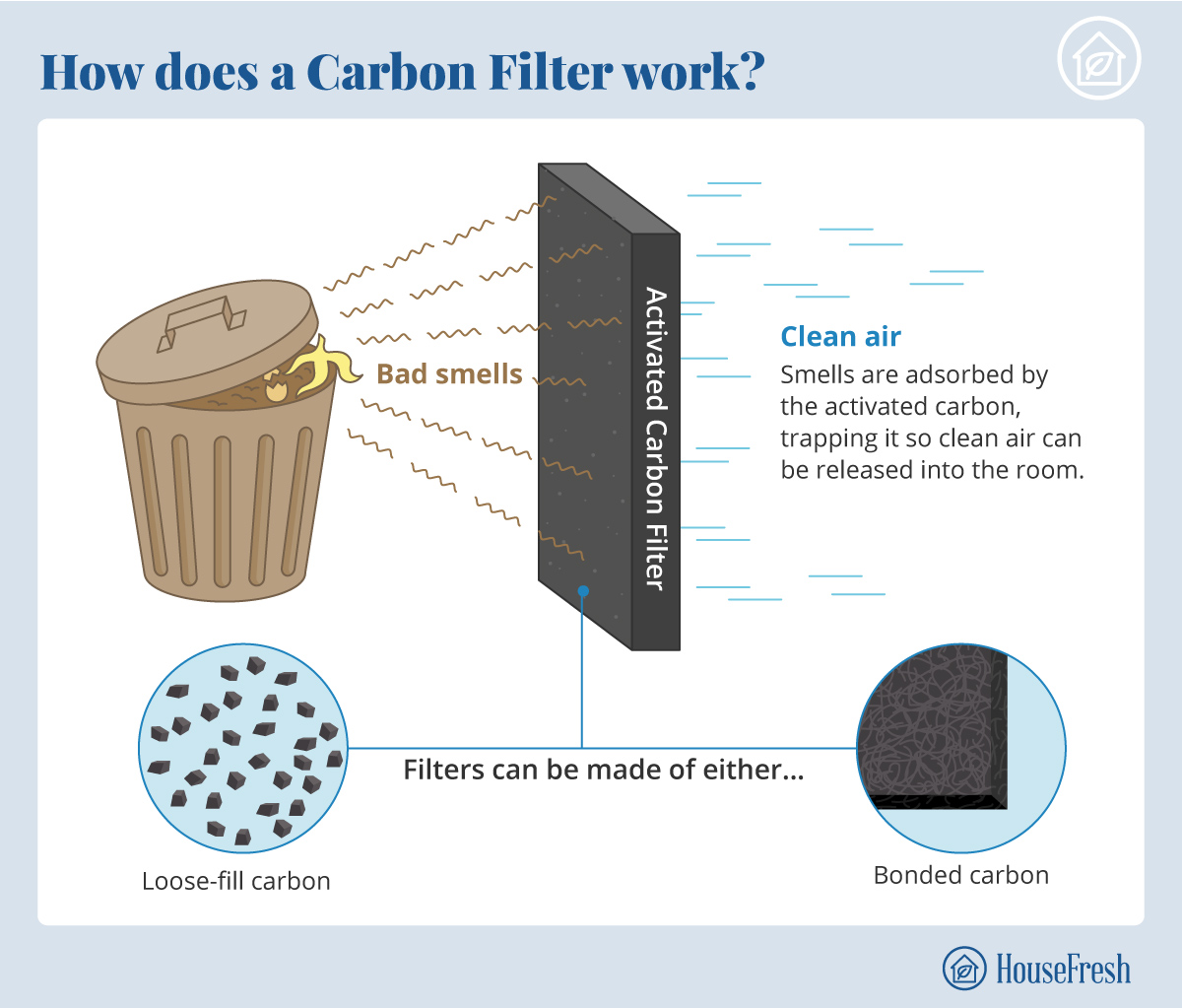

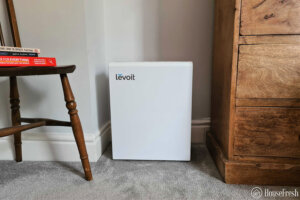
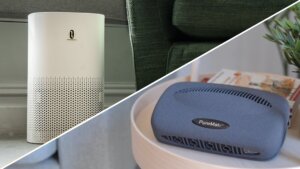

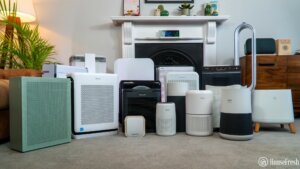
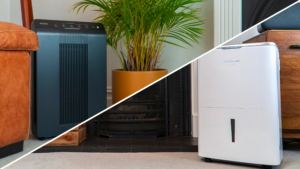
Hi there – I would like to know which air purifiers are the best of getting rid of the smell of cigarettes?
Thanks for your help!